
The University of Rhode Island
Master of Public Administration Program
University of Rhode Island,
Providence Campus
Providence, RI 02903
uri.edu/politicalscience/academics/m-p-a-program
Short-Term
Rentals in
Rhode Island
Prepared for:
Rhode Island
League of Cities
and Towns
1 State St # 502, Providence, RI 02908
Prepared by:
Master of Public Administration Policy Fellows,
Alice Aieskoll, Jake Clemen, Jenna Maloney,
Zachary Perkins
Faculty Supervisor:
Aaron Ley, Ph.D.

1
Executive Summary
This report was requested by the Rhode Island League of Cities and Towns with the overall aim of
creating a universal tool municipalities could use in managing short-term rentals (e.g., Airbnb,
Homeaway, etc). Upon studying the current environment for short-term rentals, the complexities
associated with the short-term rental marketplace became clear and made evident how such a tool does
not fit the current Rhode Island short-term rental economy. Instead, this report proposes policy options
for Rhode Island cities and towns to adopt after taking into account the unique context and
characteristics of each jurisdiction. The analysis included here examines the economic and social benefits
of short-term rentals while also providing policy recommendations to lower the potential drawbacks of a
burgeoning short-term rental market. The rise of short-term rentals presents new and complex policy
questions for state and local policymakers; the effective management of registration and enforcement,
taxation, nuisance considerations, and housing stock implications all merit consideration. Although
short-term rental properties are required to collect and remit taxes - similar to hotels - the process is
largely self-policed by the housing platforms themselves and the tax rates cannot be changed by
individual municipalities without General Assembly approval. The same statutes requiring General
Assembly approval for tax rate changes also prohibit municipalities from banning the listing of
short-term rental services by property owners, which means there are litigation risks associated with
these regulations. To address some of the drawbacks associated with short-term rentals, we recommend
the creation of regulations that deal with numerous issues concurrently rather than addressing each
potential issue individually. Residency restrictions (i.e. property operators must reside in property being
offered as short-term rental) and quantitative restrictions (e.g. maximum number of days a short-term
rental may be offered, maximum number of short-term rentals per municipality, etc.) each allow for
addressing both nuisance and housing stock concerns. Enforcement mechanisms we discuss include free
permitting, third-party monitoring, and direct municipal oversight.
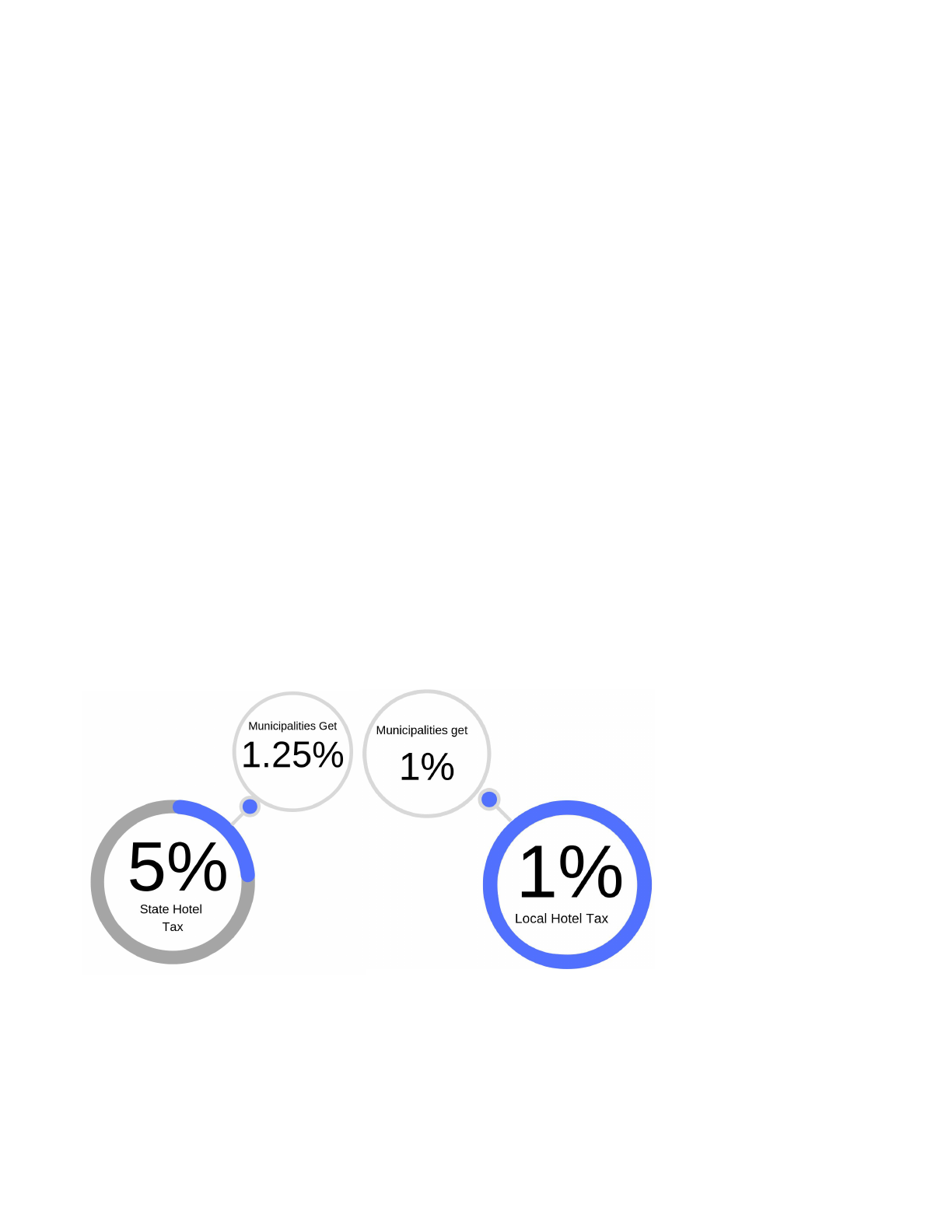
2
Background
Introduction
A short-term rental (STR) is usually defined as a rental of a residential dwelling unit or accessory
building for periods of less than 30 consecutive days. In some communities, STR housing may be referred
to as vacation rentals, transient rentals, short-term vacation rentals, or resort dwelling units. STRs can be
owner-occupied or non owner-occupied dwellings and operators can rent out entire homes, apartments, or
rooms. Many STRs are advertised using online hosting platforms such as Airbnb, VRBO, and FlipKey.
These websites have created a surge in STRs, which are spread all over the country. The number of STRs
has grown at a 45 percent annual rate over the past five years and is expected to continue growing in the
foreseeable future (Host Compliance, 2018).
Rhode Island Context
Legislative history.
To regulate the STR industry, Rhode Island legislators introduced legislation in 2015 that
expanded the state’s hotel tax to include STRs of residential property, including the rental of vacation
homes and beach cottages. The bill was supported by Governor Gina Raimondo’s administration and the
Rhode Island Commerce Corporation. Proponents of the 2015 law projected that the collective 13 percent
tax would generate $7.1 million per year that could be used to support the state’s tourism sector (Parker,
2018). Rhode Island landlords, local and state property owner associations, and home sharing platforms
like Airbnb opposed the hotel tax. Landlords considered it inconvenient and predicted that it would
discourage property owners from renting properties (Shalvey, 2015). Despite opposition from this
coalition, the legislation passed on June 30, 2015, requiring STR operators to pay the state’s five percent
hotel tax for accommodations, including apartments, beach houses or cottages, condominiums, houses,
and mobile homes. The law requires 25 percent of the hotel tax to be allocated to the municipality in
which the STR or hotel
is located. In addition,
the 2015 legislation
also amended Chapter
42-63.1 of the Rhode
Island General Laws
entitled “Tourism and
Development” to
include a provision
preventing any city or
town from prohibiting
the listing of housing
units on STR platforms
by property owners
(Rhode Island
Department of Revenue, 2015).
In May 2018, the “Relating to Property - Short-Term Rentals Act” was considered but eventually
held for further study by the General Assembly as an amendment to Title 34 of the General Laws entitled
“Property.” The “Short-Term Rentals Act” amendment sought to clarify language that defined STR listing
services, STR providers, and STR transactions, in addition to addressing affordable housing concerns,
local control, safety and health, insurance, accessibility requirements, civil rights, posting of rates, and

3
penalty concerns for STR transactions. The proposal included an amendment to Title 34 of the General
Laws entitled “Property”, which addressed safety and health concerns while also defining safety and
health standards for STR operators. This includes safety and health standards that require operators to
maintain STR facilities in a sanitary condition while also meeting healthy and safety standards such as
installation of functioning extinguishers, smoke detectors, and carbon monoxide detectors. RI General
Law § 45-24.3-8 states an STR provider may not rent a unit to another person without first thoroughly
cleaning the unit and providing clean and sanitary sheets, towels, and pillowcases. In addition, the STR
facility shall have a clearly visible list of emergency information posted. While this particular act was not
passed, it does indicate that STRs and their impacts are still being considered and further legislation may
be proposed.
Current Rhode Island regulation - registration and taxation.
An STR is a rental property that is rented for no longer than 30 days. In Rhode Island, STR
operators must register with the Rhode Island Division of Taxation, pay the annual ten dollar sales tax
permit fee, and collect and remit the sales tax and the hotel tax if independently advertising STRs (i.e., not
through a hosting platform such as Airbnb). If an online platform is used, Rhode Island law requires the
hosting platforms to register with the state’s Division of Taxation, charge and collect the tax, and remit
the tax to the Division of Taxation (Rhode Island Department of Revenue, 2018). Registration requires
completing a business application either online or at the Division of
Taxation. For STRs of an entire house, entire condominium, entire
apartment, or other such residential dwelling, operators must collect
and remit the seven percent sales tax and the one percent local hotel
tax, for a total taxation rate of eight percent (the five percent statewide
hotel tax does not apply). For room rentals of 30 days or less, the seven
percent Rhode Island sales tax applies along with the one percent local
hotel tax and the five percent statewide hotel tax for a total taxation rate
of thirteen percent (Rhode Island Department of Revenue, 2018). The
one percent local hotel tax and 25 percent of the local share of the
state’s five percent tax was passed and was expected to generate
revenue of $10.0 million in FY 2018 and $10.9 million in FY 2019 for
distribution to cities and towns (RI Senate, 2018).
History of STRs and the Sharing Economy
The practice and culture of sharing has become so integrated with technology that it is now
referred to as the sharing economy. While the sharing economy traces its historical roots to colonial times,
its fusion with modern day technology has caused it to become more widespread through online STR
platforms like Airbnb (Jefferson-Jones, 2014). The growth of STR platforms has caused lawmakers to
begin addressing the potential social and economic consequences of STRs. These benefits include
allowing STR operators to efficiently utilize space in their homes while generating additional income, and
increasing economic activity and revenue in areas that are not normally visited by tourists. The benefits of
STRs, however, must be considered along with their potential downsides, which include their effect on
the local housing market and neighborhood complaints.
Community Impact
Neighborhood effects.

4
Residents in close proximity to STRs have complained about their effect on neighborhoods. STRs
are typically associated with noise and nuisance complaints created by unknown visitors. The negative
effects that are created include increased competition for parking spaces, increased traffic, and higher
usage of local neighborhood resources like community beaches. A perception also exists that transient
STR tenants care less for public and private spaces than permanent residents and have caused lasting
damage to surrounding areas (Edelman & Geradin, 2015). As a result of these nuisances, it has become
common practice for private condominiums and apartments to set their own rules regarding STRs so that
some buildings allow them, while others do not (Edelman & Geradin, 2015). STRs have also been found
to reduce the amount of affordable housing stock (Gurran & Phibbs, 2017). If properties are bought and
used for the primary purpose of being rented out as STRs, the properties become no longer available as a
long-term housing option. One study of STRs in Los Angeles found that STRs cause gentrification in
surrounding communities, reduce socioeconomic integration, and exacerbate racial and socioeconomic
inequality (Lee, 2016).
Economic Impact
Impact on the housing market.
There is an existing debate as to whether or not STRs increase housing costs, or if they allow low
income property owners to acquire and save money to offset the costs of homeownership (Kaplan &
Nadler, 2015). For some homeowners, STR arrangements increase home and neighborhood property
values (Jefferson-Jones, 2015). The income that is added through STRs allow homeowners to pay off
mortgages earlier, while also allowing them to finance improvements to their properties that attract STR
customers and improve the desirability of the community (Lee, 2016). STRs also distribute housing
resources more efficiently, where bedrooms which
may have otherwise been unoccupied can be used
(Palombo, 2015). Kaplan and Nader (2015) found
that fewer than two percent of users have three or
more listings, suggesting that very few users are
listing at a commercial level. STRs are dispersed
around wide areas, but demand is not as high for
those far from city centers (Quattrone et al., 2016).
Consequently, there will be greater effects on the
housing market in areas with higher population
density as STR transactions increase the
prevalence of frequent short-term renters and
reduce the supply of properties to be otherwise
used for long-term residents (Lee, 2016). Cities
and towns have responded to the negative effect of STRs on local housing markets in different ways. For
example, San Francisco has taken a strong regulatory approach and requires rental operators to obtain
permits, which are only granted to homeowners with a regular presence on the property. A similar
regulation was passed in Boston to prevent STRs from removing affordable housing stock from the
market.

5
Impact on the hotel industry.
Researchers have argued that STRs are a form of disruptive innovation that will harm the hotel
industry (Guttentag, 2015). Disruptive innovation theory describes how products can, over time,
transform a market and capture mainstream consumers. The improvement of the disruptive product
eventually causes it to become more appealing to customers and thus significantly impacts existing
businesses. Airbnb, for instance, has grown to be the largest home sharing enterprise in the world, having
hosted more than 60 million guests to date (Horn & Merante, 2017). Its rapid popularity has sparked
concern over whether STRs threaten the traditional accommodation sector. Some researchers have
discovered that the number of Airbnb listings negatively affects hotel revenue in regions where both exist,
particularly low-end hotels without conference spaces (Oskam & Boswijk, 2016). In one Texas market,
every one percent increase of new Airbnb listings caused a .05 percent drop in hotel industry revenue
(Kaplan & Nadler, 2015). An additional study strongly suggests that Airbnb provides a viable, but
imperfect, alternative for certain types of overnight accommodation. Lower-end hotels and hotels not
catering to business travelers are highly vulnerable to increased competition from rentals enabled by firms
like Airbnb (Zervas, Proserpio and Byers, 2017). Another analysis demonstrated how some hosts signaled
a preference or expectation for guests of lower income levels by self-identifying the service as a low-cost
option targeted toward frugal and less discerning guests (Lutz & Newland, 2017). Studies also
demonstrate that STRs minimally impact the hotel industry and that hotels are beginning to list vacancies
on STR platforms (Edelman & Geradin, 2015).
Economic development.
STR platforms utilize real-time market conditions to deliver efficiencies in pricing. Airbnb was
designed to address the influx of prices caused by high-demand events like conferences (Edelman &
Geradin, 2015). Research shows that Airbnb guests tend to stay an average of two days longer than
typical hotel guests (Kaplan & Nadler, 2015). During 2012-2013 alone, Airbnb guests spent $632 million
in New York City and supported over 4,000 jobs. Furthermore, Airbnb argues that its offerings expand
tourism to areas at such a rate that hotels benefit from the increased overall market demand for
accommodations (Boswijk, 2016). Moreover, STRs provide market segment fulfillment for consumers
seeking sharing (particularly of a home), practical novelty, and interaction novelty, which further supports
increased tourism in a way that hotels cannot (Guttentag, 2016). The income effect is also significant and
positive, demonstrating that guests higher in socioeconomic status are more likely to book an entire home
than consumers of lower socioeconomic status, providing further market segment fulfillment by drawing
in customers that are not attracted by hotels (Lutz & Newlands, 2017).
The capacity for individual residences in neighborhoods to offer one or more rooms via STR
platforms carries substantial potential financial benefits to homeowners in particular and the
neighborhood at large (Palombo, 2015). Airbnb contends that STR platforms and home sharing allows
visitors to stay longer, spend more money, and provide more income to the local community (Boswijk,
2016). In an Oregon study, some cities indicated that STRs provide new tax revenues and support for
tourism by providing additional lodging options and, thus, drawing tourists into areas they might not have
otherwise visited (DiNatale, Lewis & Parker, 2017). STRs also keep guests away from centrally located
hotels, which provides an opportunity for additional neighborhood improvement via homeowner revenue
increases (Kaplan & Nadler, 2015). The neighborhood improvement may also come via the shared city
initiative where owners of Airbnb properties can donate part of each stay toward supporting
community-based activities (Palombo, 2015).

6
Regulatory Implications
STRs blur the distinction between commercial and residential activity, which makes applying
municipal land-use regulations difficult (Gurran & Phibbs, 2017). Cities seek to stimulate the positive
economic effects of STRs for the tourism industry, local entrepreneurs, and its hosts while minimizing
two negative effects that rank high among the concerns of residents: (1) the shortage of affordable
housing and (2) neighborhood changes (Nieuwland & Van Melik, 2018). Nieuwland and Van Melik
(2018) published a study where they found three general regulatory approaches to STRs – prohibition,
laissez-faire, and allowing STRs with certain restrictions. The first approach bans STRs altogether in an
entire community or certain district. Although this approach countered the negative effects of STRs, local
governments sacrificed tax revenues and added homeowner income, while also creating an underground
market for STRs (Nieuwland & Van Melik, 2018). The laissez-faire approach prescribes not interfering
with the industry and proposes no regulatory options. The most commonly adopted approach is the third
one, which permits STRs with restrictions.
Numerous regulatory options exist under this third option, including an STR permitting process
limiting the amount of permits per neighborhood (or square mile), prohibiting “conversion” by stopping
landlords with no-fault evictions from listing as STRs for one year, and allowing STRs only in buildings
that meet an inclusionary housing threshold where a certain percentage of the units in the building are
deemed affordable long-term housing (Lee, 2016). Nieuwland and Van Melik (2018) identify the
following as the four overall types of restrictions: quantitative restrictions limiting the amount of STRs,
the number of visitors, the number of days, and the number of times an Airbnb can be rented out per year;
locational restrictions confining STRs to certain locations; density restrictions limiting the number of
STRs in certain neighborhoods; and lastly, qualitative restrictions limiting STRs by defined type of
accommodation (i.e., complete apartment, room, commercial-style Airbnb, etc.).

7
Problem Identification and Policy Alternatives
Nuisance
This section of our policy analysis will focus on the problems that arise when STRs become more
prevalent in communities. The most common complaints that occur involve nuisance behavior, such as
loud noise, increased trash, parking issues, and additional traffic. Neighbors in proximity to STRs have
complained of late night check-ins, loud music and backyard gatherings after bar hours, the late night use
of outdoor hot tubs, marijuana smoke, and loud profanity (Weisburg, 2016). Residents have also voiced
concerns about neighborhood preservation as transient visitors have become more prevalent in
neighborhoods. Permanent residents argue that short-term tenants are without ties to the neighborhood
and therefore do not reflect the community’s values (Jefferson-Jones, 2015). Local residents also argue
that residential areas are not zoned for lodging purposes. Although hosting platforms claim that these
types of complaints are uncommon, nuisance behavior is a very real issue for local residents living near
STR properties. For Rhode Island communities confronting issues relating to nuisances, we have explored
several alternative policy responses that may be available to them. They include the following:
Alternative 1: Require renters to agree to “house policies.”
One approach to handling nuisance behavior is to require renters to agree to “house policies.” In
Miami, rental operators must provide written notice to transient occupants of vacation rental standards
and regulations for noise, public nuisance, parking, solid waste collection, and common area usage
(Miami-Dade County, 2018). Similarly, in Maui, rental operators are required to post house policies,
which must be signed by renters. House policies in Maui must include quiet hours from 9:00 p.m. to 8:00
a.m., during which time the noise from STRs shall not unreasonably disturb adjacent neighbors. Sound
that is audible beyond the property boundaries during non-quiet hours shall not be more excessive than
would be otherwise associated with a residential area. Maui County also requires rules on parking and
group gatherings to be included in STR house policies. Vehicles must be parked in designated onsite
parking areas and they are not to be parked on the street. Finally, the policy associated with the property
must state that no parties or group gatherings other than registered guests shall occur (Code of the County
of Maui, Hawaii. Title 19, Article IV., Chapter 19.65). One clear benefit of considering the posting of
house rules as a regulatory alternative is that there is minimal financial cost related to posting written
rules. One downside, however, is that it will be difficult to these rules without and enforcement
mechanism that requires routine inspections and the imposing of fines, which will be discussed later in
this section.
Alternative 2: Financial penalties.
In response to neighborhood nuisance, cities and towns can impose fines on the offending STR
operator or on property renters. Under this type of response, STR operators are responsible for having
written rules in place regarding noise, trash, and parking, while also notifying renters of fines associated
with noncompliance. Written notice would be necessary to ensure renters are aware of STR policies and
will have an opportunity to abide by them. A positive aspect of this option is that it carries with it a
deterrent effect, which may stop unwanted nuisances from occurring in the first place. High fines levied
on property owners for a guest’s nuisance behavior may give hosts a stronger financial incentive to
require more respectful behavior from guests or to carefully examine the background of guests renting the
property. Another option is to place the burden of compliance on the renters. A major financial incentive

8
exists for renters to comply with nuisance rules and regulations, because so many of them are motivated
by the financial savings associated with STRs. Fines can also be used to fund resources that help ensure
greater STR regulatory compliance, such as hiring a municipal employee responsible for enforcing the
local STR laws. One downside to this alternative is that imposing high fines may ultimately deter STR
operators from renting their properties, which may lower the number of available STR properties.
Alternative 3: Require STRs to be owner-occupied.
Requiring primary residence is not an uncommon response for addressing STR issues. This action
prevents commercial operators (those who rent three or more properties) from large-scale renting. The
City of San Francisco allows a host to register his or her primary residence only, defined as the place
where the host resides 275 calendar days per year (San Francisco Office of Short-term Rentals, 2018). For
275 calendar days, the property will not be used as an STR as it will be used as a primary residence.
Without this restriction, a property can be used as an STR every day of the year. Since this regulation
limits the amount of time a property can be used as an STR, opportunities to generate nuisances are fewer.
Boston is another city that requires tenants and investors to occupy their rental units in order to list
properties as STRs. One downside to this approach is that it will be met with fierce criticism or possible
lawsuits from commercial operators and owners who have purchased property for the sole purpose of
using them as STRs. The benefit of this option is that requiring operators to claim primary residence of
their properties may encourage the rentals to become long-term rentals that add to the available housing
stock. San Francisco and Boston are cities with housing shortage concerns, so this type of regulation is a
particularly beneficial way to respond to this problem.
Alternative 4: Frequency restrictions.
Another way to address nuisance behavior is to limit the number of days renting can occur on
STR properties. San Francisco limits rentals to a maximum of 90 days per year when the host is not
present in the unit. Property owners violating the ordinance are fined $484 for the first offense and up to
$968 for repeat offenses (San Francisco Office of Short-term Rentals, 2018). Similarly, in London, a
property can be used as an STR for a maximum of 90 days per year. The downside of this approach is that
it restricts the way owners can use their property and will cause opposition from STR operators.
Moreover, enforcement of this regulation poses its own challenges in that it will require municipalities to
develop systems that monitor the number of days STR properties are being used as rentals. San Francisco
is one of the only cities with an Office of Short-term Rentals to handle all STR matters. As we will
discuss in a later section, creating a separate office to respond to STR matters is costly because it involves
staffing and financing a new organizational unit.
Alternative 5: Restrict occupancy.
Another way to limit nuisance complaints is to place limits on the number of occupants allowed
per household or per room. This alternative is aimed at preventing loud parties on STR properties. In
Miami, the maximum overnight occupancy is two people per bedroom, plus two additional people per
property, up to a maximum of 12 people, excluding children under three. In Maui, guests must agree to a
policy of no parties or group gatherings. The downside of this alternative is that it limits the number of
people and, thus, limits the potential for additional local revenue by placing limits on occupancy.
Allowing more people into cities and towns allows visitors to spend money in restaurants and bars, movie
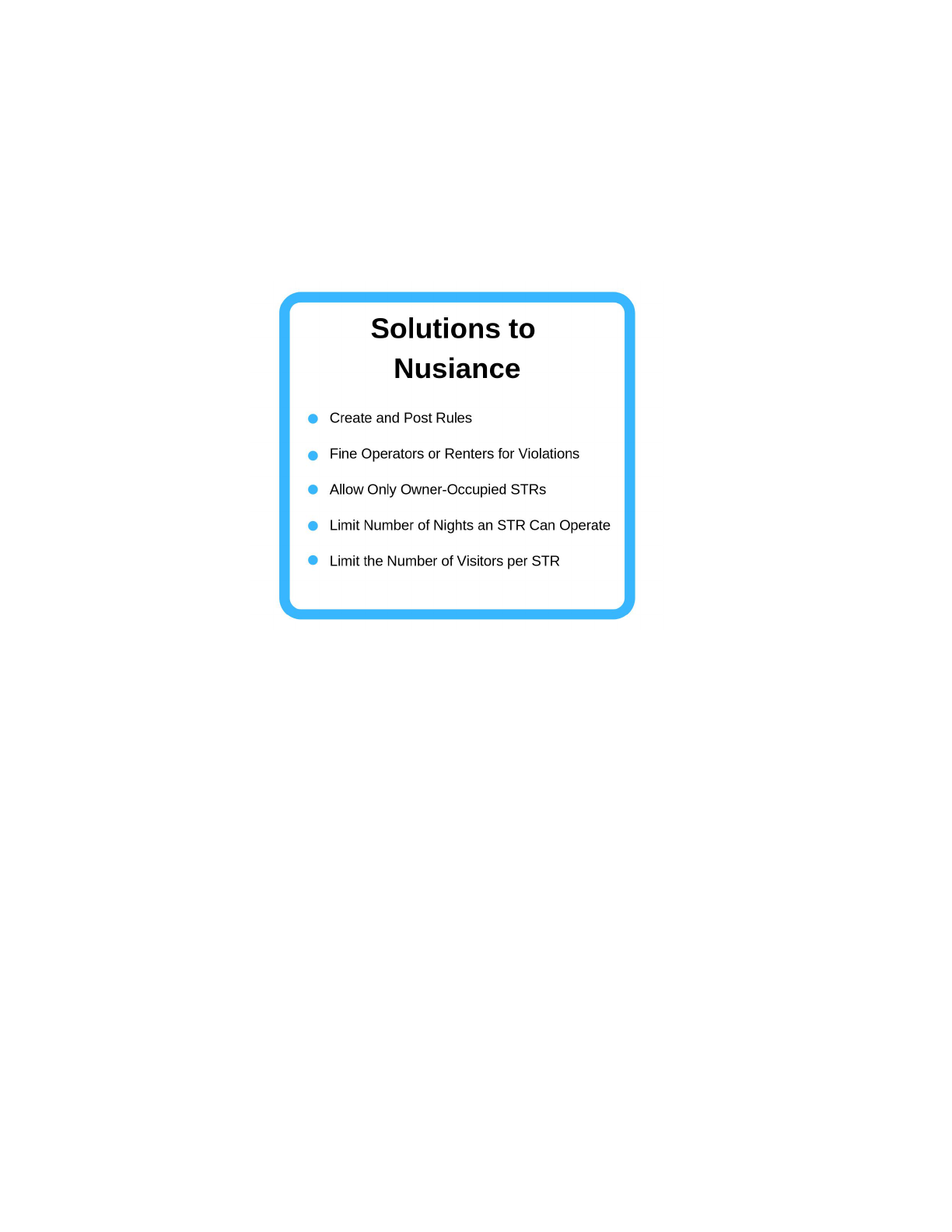
9
theaters, and other locations. Another shortcoming is that regulation would be difficult as there is no way
to ensure compliance from renters because STR renters can secretly invite additional guests to the
property without the property owner’s knowledge. Furthermore, limiting the number of guests does not
promise that noise will be abated because noise can be generated by any group, no matter how small. The
benefit of this alternative is that it minimizes nuisance behavior by restricting parties and minimizes the
potential for noise and neighborhood nuisance.
Housing Stock
The effect on housing stock is another common issue arising with the growth of STRs in
communities. In this section we focus on several emerging issues regarding both documented and
anticipated STR impacts on housing stock. The two main issues relating to housing stock that we
analyzed for this report include hotelization and low- and moderate-income housing impact. An analysis
of these impacts on RI municipalities and our associated recommendations follow.
Hotelization.
Hotelization occurs when property owners convert housing units from long-term rentals to STRs
with the aim of making more money. These property owners usually have more than one listing on STR
platforms, with two listings being the most common. Property owners with three or more listings are
considered to be commercial operators, which make up only three percent of Airbnb property owners
nationally (Kaplan and Nadler, 2015). Both of these aforementioned instances - two property listings by
one owner and three or more listings by another owner - remove long-term housing from the market.
Kaplan and Nadler (2015) identify a more malicious form of hotelization where landlords of large
apartment complexes pursue no-fault evictions of tenants in order to turn their complexes into more
profitable large-scale STR's. Abcarian (2015) interviewed one tenant from San Francisco who was not
allowed to renew her long-term lease, which was then listed as an STR for $250 per night. Higher rates of

10
hotelization not only lead to reductions in long-term housing, but also cause an increase in the cost of
existing long-term housing.
In November of 2018, there were a total of 2,758 Airbnb listings in Rhode Island, of which 936,
or 33 percent, are hosted by commercial operators (InsideAirbnb.com, 2018). Of those listing STRs in
1
Rhode Island, 169 are commercial operators, comprising 18 percent of all operators in the state. As such,
Rhode Island’s ratio of commercial Airbnb operators to total operators may be six times greater than the
national average. While many of these commercial operators list standard names like “Cindy” or “Mike,”
several more are listed under names that indicate they are without question commercial operations. These
include “Evolve Vacation Rentals” with 26 unique listings, “AMPM Property Management” with 13
unique listings, and “Atlantic Beach Hospitality” with 13 unique listings. Overall, 71 percent of Rhode
Island Airbnb listings are whole home rentals and 29 percent are room rentals according to the
InsideAirbnb data(2018). In comparison, commercial operators in the state offer 60 percent of their
listings as whole home rentals and 40 percent as room rentals (InsideAirbnb.com, 2018). This
demonstrates that commercial operators tend to operate both types of STRs - whole home and room
rentals - in contrast to some of the national data mentioned above. As a means of preventing hotelization
from reducing long-term rental stock, three primary regulations can be imposed: tiered fee structures, time
limitations, and owner residency restrictions.
Alternative 1: Tiered fee structure.
One way of addressing the issue of hotelization of STRs is by adopting a tiered registration fee
structure. This fee structure progressively increases the cost of offering an STR based upon the number of
STRs a single operator runs. Portland, Maine has adopted such a system where operators renting property
for less than 30 days must register with the city for $100 annually if listing a single unit. For two units in
the same building the fee increases to $250, which increases to $2,000 for five units. For non-owner
occupied rentals, a one unit fee is $200 with the fee increasing to $4,000 for those operating five units or
more. Discounts are applied for prohibiting smoking, installing sprinkler systems, or having fire alarms
that are connected to local fire departments. A $1,000 penalty is fined for providing false information on
the registration form (portlandmaine.gov, 2018). One of the key benefits of a tiered STR fee structure is
that municipalities can even the playing field between high volume commercial operators and low volume
operators, while also keeping incentives in place to discourage the removal of long-term housing. The
primary costs of this fee structure are those associated with developing and enforcing a registration
process, as well as forgoing the taxes associated with increased STR offerings brought by commercial
operators.
Alternative 2: Frequency restrictions.
Frequency restrictions limit the number of days a specific unit is listed on an STR platform.
Several options are available for this type of frequency restriction: days per year, days per month, months
per year, etc. Rhode Island municipalities near beaches, for instance, may choose to implement frequency
restrictions that allow STR listings only during the months of June, July, and August. With South County
being a primary housing location for academic-year undergraduate and graduate students from the
1
This data, as well as all other RI data in this section, is a result of analysis that took place in November 2018. InsideAirbnb data is a snapshot of
a moment in time and is the main source of data for several other academic studies (see Gutiérrez et al., 2016; Kakar, Franco, Voelz, & Wu,
2016) on STRs despite its limitations.

11
University of Rhode Island (URI), restricting STRs to the summer ensures long-term rental availability,
while also providing property owners with the best period of the year to offer STRs in a high tourism
region. One benefit of this alternative is that it provides greater certainty in preventing the prevalence and
growth of commercial operators from reducing long-term housing availability. Although the benefit is
more certain, the downside is more pronounced, as well: only allowing STRs for a limited number of days
stops property owners from collecting revenue that is earmarked for making improvements to their
property.
Alternative 3: Require STRs to be owner-occupied.
An owner residency restriction limits eligibility for STR listings in a particular municipality to
just those property owners who reside on the premises of the STR offering. Currently, Boston allows
STRs to operate only if they are owner-occupied units (Sokolowsky, 2018), meaning that hotelization is
effectively illegal. It is important to note that this option is currently the subject of an Airbnb lawsuit
against the city of Boston (Associated Press, 2018). Although this would be a guaranteed means of
eliminating hotelization, for some municipalities litigation of this nature may be cost-prohibitive and has
substantial potential cost downsides should an STR platform file suit like in Boston.
STR market penetration and low and moderate income housing (LMIH).
Decreased low and moderate income housing availability is perhaps one of the most
consequential documented effects of STR prevalence in municipalities. LMIH is also cited as a building
block for effective community economic development and facilitating economic growth (Wardrip,
Williams, & Hague, 2011; Klacik, 2003). In 2004, the RI General Assembly passed the Low and
Moderate Income Housing Act to address this issue. That law recommends that municipalities have at
least ten percent of their housing units categorized as LMIH (RIGL 45-53-2). To date, only five
municipalities have accomplished this target for affordable housing and so it is important to take into
consideration the current state of LMIH in Rhode Island. Table 1 demonstrates market penetration of
STRs in all 39 municipalities along with the percentage of all housing in each municipality categorized
2
as LMIH and the change in LMIH from 2014-2017:
2
STR penetration in the housing market is calculated by taking the number of residential properties offering STRs
and dividing this by the total number of housing units in a particular municipality
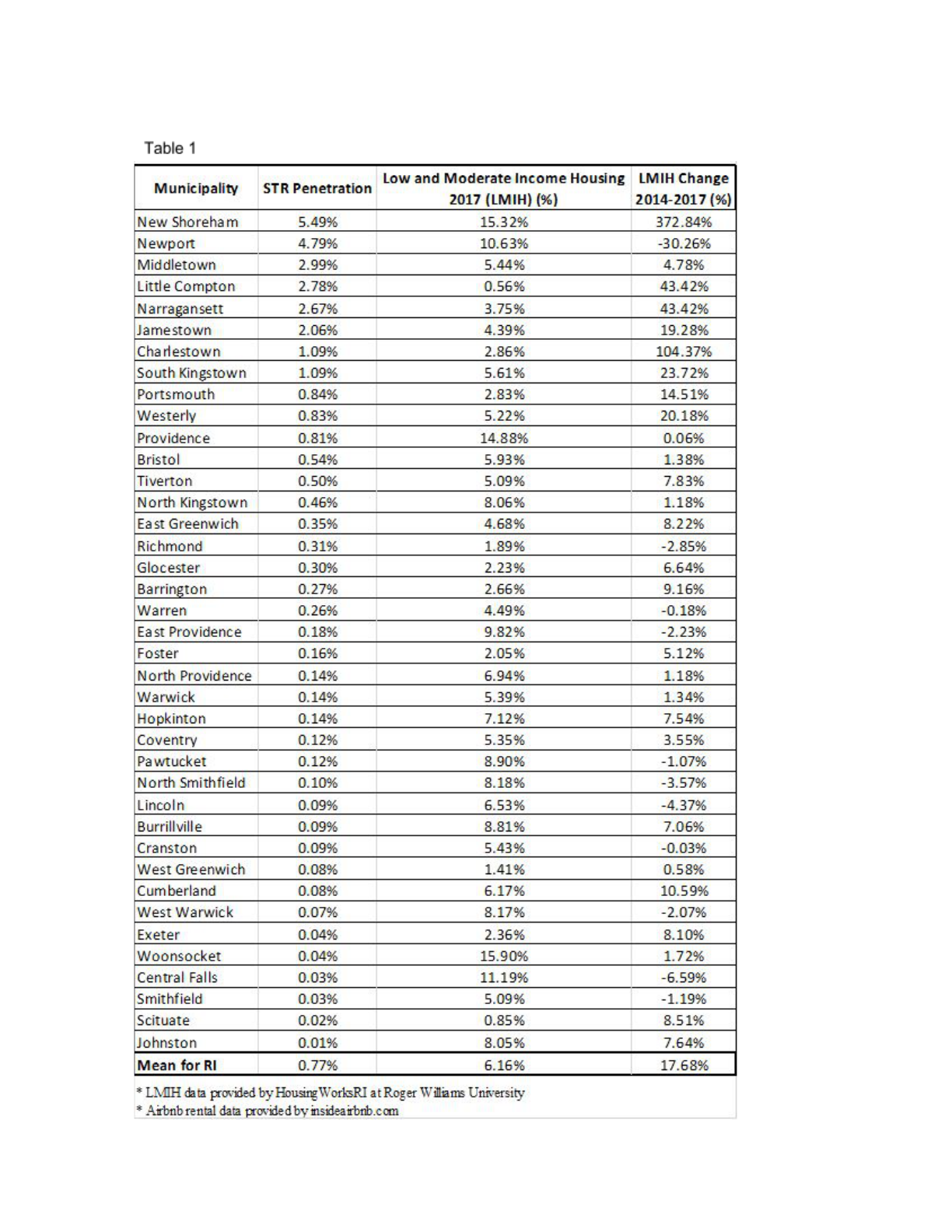
12

13
Due to RI state government attempting to influence an increase in LMIH (reflected in an average
municipal LMIH increase of 17% across the state) and a burgeoning STR market that is demonstrating
growth, there is substantial potential for overlap wherein STR offerings replace LMIH. Given that the vast
majority of municipalities in the state do not provide the statutorily recommended minimum amount of
LMIH, several regulatory options exist for municipalities to consider: quantitative restrictions, qualitative
restrictions, and time-horizon restrictions.
Alternative 1: Quantitative restrictions.
Quantitative restrictions allow STRs only insofar as a certain proportion of all community
housing is already designated and available for low and moderate income persons (e.g., ten percent as
statutorily recommended). This could be broken down by building, neighborhood, or by taking the LMIH
proportion of the municipality as a whole. By ensuring a ready supply of LMIH through a quantitative
restriction of STRs, it is possible that lower income persons will have access to affordable dwellings. The
feasibility of these regulations hinge on a permitting or licensing process that is in place, as well as
adequate tracking of the LMIH proportion of total housing. With this information available, a
municipality can restrict new permits from being issued whenever that municipality’s annual LMIH data
indicates it is not meeting the state statutory recommendation of ten percent.
Another option for quantitative restrictions would be to restrict the number of STR permits or
licenses made available through the municipality. This could be done in absolute terms or in proportion to
property demographic changes. For example, a municipality of 2,000 households allows permits for 50
STR properties. Or if 40 new houses are built in a municipality, STR permitting can be expanded by one
for the following year (maintaining a 2.5% STR penetration rate). By capping the number of STRs, a
municipality can quickly control potential LMIH effects from the growing STR market. The most notable
downside to all these quantitative restrictions is the capacity required for enforcement and the capping of
permits, the loss of tax revenue from not allowing more aggressive STR expansion, and the loss of
revenue to property owners.
Alternative 2: Operational restrictions.
Operational restrictions differ from quantitative restrictions in that no limitations are placed on
whether
somebody may offer his or her property as an STR. Rather, operational restrictions limit how
much
of a property can be offered for rent or how often
that property can be rented. The latter portion is
akin to the frequency restrictions noted in the hotelization section. As such, these restrictions limit either
the number of rooms that are allowed to be rented per property or the number of times a property is
allowed to be rented (per week, per month, etc.). With a system like this being such a complicated
undertaking, the primary cost to the municipality of pursuing this type of restriction would be the ongoing
collaboration and tracking, along with Airbnb and other rental services, of how often a particular property
is rented. The primary benefit of this alternative is that it allows earnings from STR listings, organic
growth in property owners that list as STRs, and the preservation of some housing stock for LMIH.
Moreover, this alternative also decreases the potential for nuisance issues as noted in the nuisance section
of this report.
Alternative 3: Proximity restrictions.
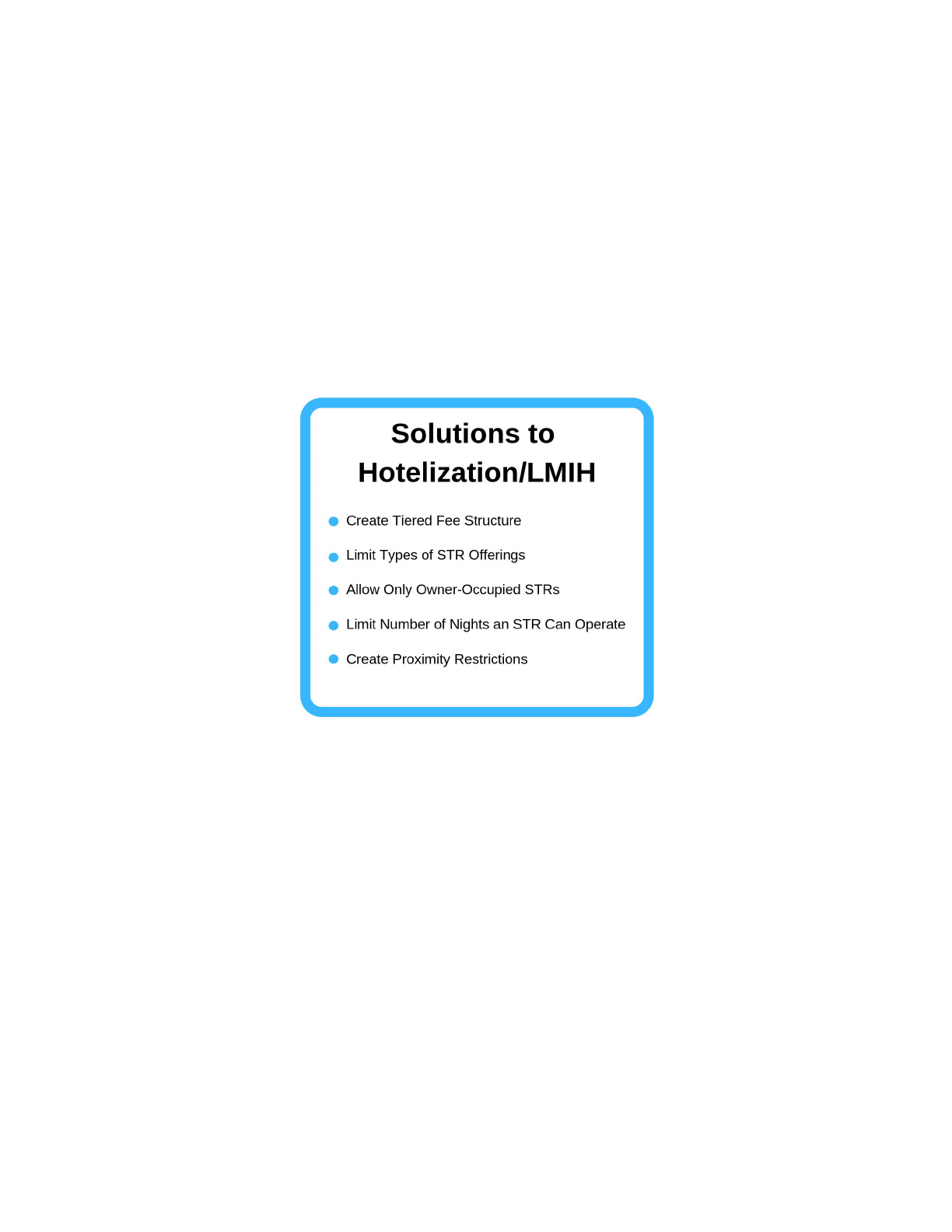
14
A proximity regulation requires a tracking process, like the permitting and licensing identified
with quantitative regulations. However, unlike quantitative restrictions, proximity regulations restrict new
STRs from being located within a certain distance of already existing ones. Although this requires
substantial public education on the part of the municipality, it allows a more fine-tuned approach to
addressing the neighborhood LMIH impacts of STRs. This regulation enables a municipality to ensure
STRs are spread throughout the various locales of a particular neighborhood which, in turn, better ensures
that LMIH stock can be available throughout the various locales of particular neighborhoods. The primary
downside of this alternative is the substantial investment required by a municipality in determining the
optimal proximity restriction (e.g. 500 ft, 2 blocks, distance varying by population density, etc.) and
utilizing geographical information systems to maintain an accurate database of active STRs that are
licensed and permitted.
Enforcement
Municipalities have adopted a variety of different regulatory measures like those above. We have
concluded that enforcement of any alternative that is adopted will pose significant challenges for
communities addressing the issue of STRs. Lack of regulatory enforcement allows STR operators to
violate municipal ordinances, zoning codes, and required registration procedures without consequence.
Hawaii dealt with this issue when STR platforms were not required to register nor comply with STR tax
laws. According to Ross Birch, the Executive Director of the Island of Hawaii Visitors Bureau, less than
25 percent of Airbnb and VRBO operators are registered and paying taxes. A total of 2,034 operators are
registered compared with 8,647 STR listings (Lauer, 2018). Airbnb does not collect or remit taxes in
Hawaii, but legislation is pending that requires software platforms to submit them (Sokolowsky, 2018).
Two different lodging standards exist in Rhode Island, one for licensed and inspected hotels and inns, and
the other for STR properties, which are not licensed or inspected. This raises questions as to how
municipalities should identify STR properties and formulate an equitable approach to regulating them
(Bridges, 2018). To comply with the state’s Short-Term Rentals Act, enforcement agents, whether as
private contractors or municipal employees, should be charged with ensuring that safety and health

15
requirements are being met. The following alternatives represent some strategies for ensuring better
enforcement of STR regulations.
Alternative 1: Free permitting and permit display.
Nguyen, Taheri, and Valenta (2016) analyzed STR permitting in Los Angeles and recommend
creating a system with free permitting that requires STR permit numbers to be displayed on any
advertisement. The authors argued that compliance under such a system will increase because it will be
easier to identify operators that are not in compliance with STR policies. STR platforms have resisted
complying with these ordinances, causing some municipalities like Portland to take legal action against
platforms that do not require users to register with municipalities before using the platform (Njus, 2018).
In Portland, Airbnb, for its part, has aided in enforcement by removing ads not displaying permit numbers
(Nguyen et al., 2016). Making the permitting process available through an automated online platform and
at no cost expedites the process and encourages compliance from those not earning large sums of money
through STR rentals (Nguyen et al., 2016). Nguyen et al. (2016) also suggest that municipal workers can
easily find STRs not complying with local regulations because the permit number will not be displayed
with advertisements. While most of these regulations refer to displaying the permit number in an
advertisement, in New Hampshire STRs also have to display their physical permit in a visible window.
Municipalities could choose to require the permit number to be posted on advertisements and a copy
posted at the physical location. It is important to note that this enforcement mechanism has caused
litigation between platforms and municipalities elsewhere, while also adding to a municipality’s
responsibilities by requiring the creation of an online permitting system that employees will review for
compliance.
Alternative 2: Third party compliance monitoring.
Municipalities can outsource enforcement efforts by contracting a third party company to review
STR locations and activity. In Newport, city records indicated 198 registered STRs, but Airbnb notified
Newport that they had 390 active hosts that accommodated 22,000 guest arrivals staying at an average of
two nights per month (Rulli, 2018) In response, Newport hired a private company, Host Compliance, to
identify the registered establishments within the municipality. The price of contracting with Host
Compliance, LLC depends on the number of STRs within a municipality and the type of monitoring
services purchased. In 2017, the City of Newport paid $29,980 for this service as a way of monitoring
STR identification and compliance. One benefit of partnering with a third party service provider is that
monitoring begins quickly and there is no need for designing and executing a municipal personnel
training system. The costs associated with contracting third party compliance monitoring results in
reduced municipal control and oversight of STR activity. However, depending on the level of STR
activity within a municipality, contracting out for compliance monitoring could be a better option than
hiring a municipal officer. In some municipalities, STR activity may be too low to provide a return on
investment for contracting out for STR services.
Alternative 3: Municipal oversight and control.
The Newport Planning Board’s STRs investigative task force recommended the hiring of an STR
officer for municipalities dealing with STR issues. An officer hired for this position collects registration
forms and fees, works with state and local tax offices to collect revenues, and identifies illegal guest
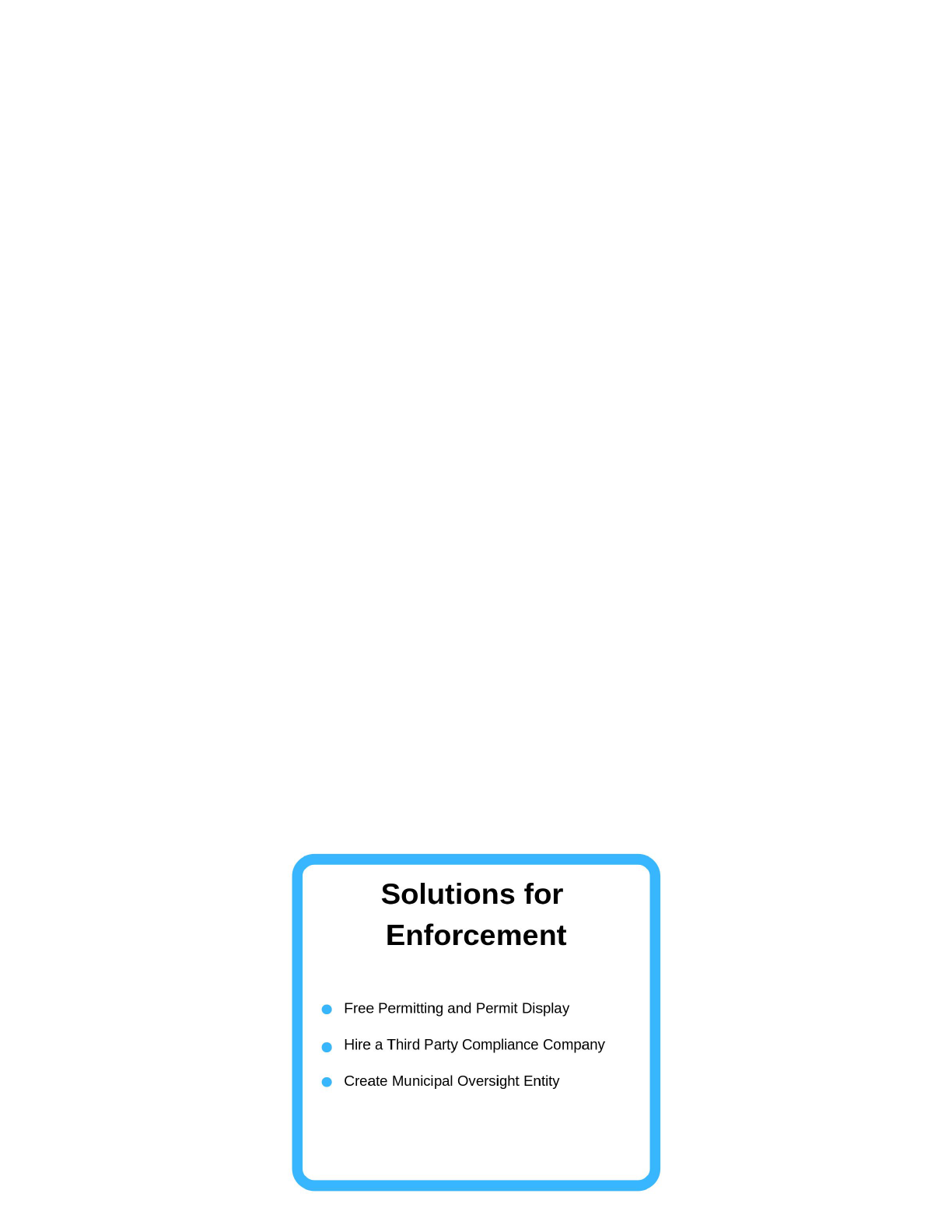
16
houses by reviewing hosting platforms (Flynn, 2017). Allocating funding to support a monitoring agency
will require considering how the agency will be funded in the municipal budget. For example, in the
FY2018 budget, the City of Newport allocated $1,568,921 and expended $1,576,243 in police salaries, as
well as $22,479 in direct enforcement, with overtime totaling $75,000 as expended. In addition, the City
of Newport expended $456,000 dollars in FY2017 to support personnel in planning and zoning
enforcement (City of Newport, 2018). The City of Newport’s Planning Board supports increasing the
STR registration fee over the current amount of $45 in order to help defray personnel costs and to
increase the municipality’s monitoring and enforcement capacity. At the current registration fee of $45,
registration user fees can generate revenue for the municipality should all STR operators register their
STR units. For example, for the 12 months leading up to July in 2018, Newport had 708 active whole
home rentals (Flynn, 2018), which generated $31,860 in revenue for whole home rental registration.
Within the same time frame, Newport had 462 rooms available for rent, with only 16.16 percent rooms
registered. Ensuring that all STR room operators register their STR units would yield $20,790 in revenue
based on registration fees for Newport (Flynn, 2018). The Short Term Rentals Investigatory Group
recommended that the $45 registration fee for Newport could be increased substantially; allowing for
increased revenue for the municipality to further support personnel costs while adding greater capacity to
monitor regulatory compliance (Flynn, 2018). The task force recommended hiring a municipal
administrator responsible for enforcement of registration requirements and administering fines set at a
minimum of $1,000 for listing unregistered STR units online. Any revenue generated would then be
redirected to the Town’s restricted funds to continue supporting personnel costs to administer STR
monitoring compliance. For owners who continue to advertise illegally or rent without registering their
STRs, the task force also recommended that fines should increase for owners (Flynn, 2018).
Municipal control may also become burdensome over time, especially as STR numbers increase
substantially. Municipalities may not be able to commit the necessary resources and support in the
oversight process. Municipalities also do not know the future of the STR market, and committing
permanent resources and personnel to enforcement may be a poor investment. Platforms like Airbnb have
been fairly good at complying with regulations but have certainly not gone out of their way to help
municipalities with enforcement, and these platforms value the privacy of operators. Overall, municipal
oversight may be infeasible for smaller municipalities and unwieldy for larger ones, but it provides total
control over STR enforcement.

17
Rhode Island Tax Implications
Current STR Tax
The State of Rhode Island currently taxes STR operators by varied amounts depending on the
type of STR dwelling, with funds being collected and distributed in different ways. An entire house,
cottage, condo, or apartment is taxed at a seven percent sales tax rate and a one percent local hotel tax rate
(totaling eight percent). The seven percent state sales tax is allocated to the state’s general fund while the
one percent rate is distributed to municipalities. Short-term room rentals are taxed an additional five
percent, which is the state hotel tax (for a total taxation rate of thirteen percent). The funds from this state
tax are distributed to municipalities, the RI Commerce Corporation, regional tourism councils, the
Providence/Warwick Convention & Visitors Bureau, and East Providence escrow. According to data from
Inside Airbnb (2018) about 70 percent of Airbnb rentals are whole home rentals, while 100 percent of
VRBO and HomeAway rentals are whole properties. This makes approximately 30 percent of STRs
subject to the state hotel tax. State law precludes municipalities from creating their own taxes on STRs as
stated in RIGL § 42-63.1-8.
Municipal Tax Revenue from STRs
Tax
Whole Home
Room Rental
Local Hotel Tax
1%
1%
State Hotel Tax
N/A
1.25%*
Totals
1%
2.25%
*Municipalities get 25 percent of the five percent State Hotel Tax
Municipal Income
Municipalities receive one-fourth of all
revenue from the five percent state hotel tax. The RI
Division of Taxation collects the tax and then
distributes it to the municipality. The RI Division of
Taxation publishes monthly reports on the five
percent state hotel tax, and a separate monthly report
on the one percent local hotel tax, with the most
recent available report created in June 2018 (RI
Division of Taxation, 2018). According to the RI
Division of Taxation, in FY18 municipalities
received a total of $10,138,681 as revenue from state
and local hotel taxes. It is very important to note that
both the state hotel tax and the local hotel tax is
mostly comprised of taxes on hotel rooms, not STRs.
Newport, which collected the largest amount of taxes,

18
collected $2,561,498 from hotels but only generated $195,528 from hosting platforms. The five
municipalities generating the most revenue from both taxes combined, only earned between two and eight
percent of that total from STRs. An overwhelming 90 percent of all combined municipal revenue from
hotel and local taxes comes from hotels. There are exceptions with New Shoreham, Narragansett,
Charlestown, Jamestown, and Little Compton each earning between 51 and 74 percent of hotel and local
tax revenue from STRs. The cause for this discrepancy might be due to a number of factors, including a
lack of major hotels or different types of tourism, but these communities in particular may benefit from an
increased focus on STR taxes.
Another aspect of municipal income from STRs is the difference between room rentals and whole
home rentals. Municipalities receive a total of 2.25 percent from room rentals and only receive one
percent from whole home rentals. This is because the room rentals are subject to the state hotel tax, and
the whole home rentals are only subject to the local hotel tax. The majority of rentals in Rhode Island are
whole home rentals, around 70 percent. As mentioned before, STRs account for only ten percent of total
tax income for municipalities, and of that ten percent, 72 percent of municipal income is from whole
home rentals, while 28 percent is from room rentals. This will provide a basis for alternatives one and
two, which are described below.
The real issues municipalities face in terms of taxing STRs is in supporting the related
enforcement costs, should municipalities choose to regulate STRs. The overwhelming majority of Rhode
Island municipalities, 28 of the 39, received less than $10,000 in FY 2018, with 12 municipalities earning
less than $1,000. For most communities, the revenue generated from all STR taxes increased from FY17
to FY18, as would be expected from a growing industry. Most municipalities saw growth in the double
digit percentage range, while some increased or decreased by hundreds or thousands of percentage points,
which is likely due to a community having a small number of STRs and having new STRs emerge or the

19
few existent STRs go away. Overall, tax revenues from STRs to municipalities have been increasing over
time. For those communities with hotels, tax collections have been relatively flat by comparison, except
when new hotels are built. Whatever the case, municipalities should carefully consider the potential tax
earnings of developing an enforcement plan because at first glance funding it through permitting systems
and fines may prove to be an insufficient funding source. We will now list potential alternatives to
address the varying municipal needs.
Table 2
Municipal Revenue from Hotel and Local Taxes*
Municipality
Hotels
% of Total
STRs
% of Total
Totals
Newport
2,365,970
92%
195,528
8%
2,561,498
Providence
2,135,679
96%
87,827
4%
2,223,506
Warwick
1,218,075
98%
30,651
2%
1,248,726
Middletown
1,030,140
96%
43,829
4%
1,073,969
Westerly
639,061
93%
47,403
7%
686,464
New Shoreham
310,333
48%
342,673
52%
653,006
Narragansett
132,421
49%
139,302
51%
271,723
South Kingstown
166,960
85%
29,146
15%
196,106
Smithfield
163,623
99%
2,450
1%
166,073
West Warwick
151,434
99%
2,106
1%
153,540
West Greenwich
120,731
98%
2,741
2%
123,472
North Kingstown
107,510
96%
4,651
4%
112,161
Lincoln
110,801
99%
1,104
1%
111,905
Coventry
105,244
98%
1,994
2%
107,238
Pawtucket
86,540
96%
3,465
4%
90,005
Charlestown
18,327
26%
50,954
74%
69,281
Bristol
56,266
91%
5,286
9%
61,552
Woonsocket
50,935
98%
1,127
2%
52,062
East Providence
44,091
94%
2,950
6%
47,041
Jamestown
7,290
26%
20,445
74%
27,735
Cranston
21,027
85%
3,829
15%
24,856
Little Compton
5,805
29%
14,245
71%
20,050
Portsmouth
10,292
60%
6,810
40%
17,102
Johnston
7,159
97%
251
3%
7,410
Scituate
6,746
96%
249
4%
6,995
Richmond
3,845
59%
2,683
41%
6,528

20
Tiverton
-
-
3,645
100%
3,645
North Smithfield
3,148
98%
76
2%
3,224
Glocester
2,944
96%
110
4%
3,054
Barrington
-
0%
2,973
100%
2,973
Hopkinton
742
44%
931
56%
1,673
East Greenwich
762
69%
347
31%
1,109
Cumberland
-
-
834
100%
834
Warren
-
-
826
100%
826
Foster
560
88%
74
12%
634
North Providence
-
0%
519
100%
519
Central Falls
-
0%
123
100%
123
Burrillville
-
-
63
100%
63
Exeter
-
-
-
-
-
Totals
9,084,461
1,054,220
10,138,681
*RI Division of Taxation FY 18 TYD data from June 2018
Table 3
FY 2018 Municipal Income from STR taxes*
Municipality
1.25% Room
Rentals
1% Room
Rentals
% of
Total
1% Whole Home
Rentals
% of
Total
Totals
New Shoreham
2,527
2,023
1%
338,123
99%
342,673
Newport
53,128
42,503
49%
99,897
51%
195,528
Narragansett
4,691
3,754
6%
130,857
94%
139,302
Providence
47,535
38,028
97%
2,264
3%
87,827
Charlestown
479
383
2%
50,092
98%
50,954
Westerly
1,522
1,217
6%
44,664
94%
47,403
Middletown
10,726
8,581
44%
24,522
56%
43,829
Warwick
16,826
13,461
99%
364
1%
30,651
South Kingstown
3,148
2,518
19%
23,480
81%
29,146
Jamestown
3,919
3,136
35%
13,390
65%
20,445
Little Compton
563
450
7%
13,232
93%
14,245
Portsmouth
1,167
934
31%
4,709
69%
6,810
Bristol
1,137
877
38%
3,272
62%
5,286
North Kingstown
868
694
34%
3,089
66%
4,651
Cranston
1,747
1,399
82%
683
18%
3,829
Tiverton
528
422
26%
2,695
74%
3,645

21
Pawtucket
1,819
1,455
94%
191
6%
3,465
Barrington
312
250
19%
2,411
81%
2,973
East Providence
1,594
1,275
97%
81
3%
2,950
West Greenwich
560
448
37%
1,733
63%
2,741
Richmond
1,369
1,094
92%
220
8%
2,683
Smithfield
823
658
60%
969
40%
2,450
West Warwick
1,170
936
-
-
-
-
Coventry
993
795
90%
206
10%
1,994
Woonsocket
627
500
-
-
-
-
Lincoln
313
208
47%
583
53%
1,104
Hopkinton
137
110
27%
684
73%
931
Cumberland
89
71
19%
674
81%
834
Warren
122
98
27%
606
73%
826
North Providence
288
231
-
-
-
-
East Greenwich
173
138
90%
36
10%
347
Johnston
95
76
68%
80
32%
251
Scituate
137
112
-
-
-
-
Central Falls
70
53
-
-
-
-
Glocester
61
49
-
-
-
-
North Smithfield
42
34
-
-
-
-
Foster
41
33
-
-
-
-
Burrillville
35
28
-
-
-
-
Exeter
-
-
-
-
-
-
Totals
161,381
129,032
763,807
1,049,773
Combined Room
Total
290,413
*FY 18 TYD data from June 18
Alternative 1: Petition the state to make tax rates uniform whole home and room rentals.
Municipalities can lobby the state legislature to add a new 1.25 percent local hotel tax on whole
home STRs. This would make the tax rate between room rentals and whole home rentals more equitable,
or at least allow municipalities to generate more revenue since 70 percent of listings are whole home
rentals, and 72 percent of tax revenues are generated by whole home rentals. Of the $1,049,773 generated
by STRs in FY18, $763,807 came from whole home rentals. Creating an additional 1.25 percent local
hotel tax would have generated an additional $954,758.75 in municipal revenue in FY18 and over $1
million in future years (assuming that the tax increase does not deter STR renting behavior). From a
political feasibility standpoint, this option can be framed as leveling the playing field for all operators, and
the legislature may be more inclined to approve this small increase. As with all tax increases there may be

22
pushback from operators or platforms, but this increase keeps Rhode Island on the low end of STR taxes
when compared with regional states. Connecticut, for example, imposes a 15 percent room occupancy tax
and allows an additional one percent local tax, totaling 16 percent for STRs (State of Connecticut
Department of Revenue Services, 2017). Changing the current STR taxing structures to bring whole home
rentals to the same 2.25 percent received from room rentals may help municipalities cover the cost of
their enforcement efforts, especially considering that the overwhelming majority of STRs are whole home
rentals.
Alternative 2: Petition the state to extend the state hotel tax to all STRs.
Similar to Alternative 1, this option requires municipalities to petition the state to change state
law to include all STRs under the umbrella of the state hotel tax. This option not only provides
municipalities with a larger tax base and all the benefits listed in alternative 1, but will also benefit the
other state recipients of the five percent state hotel tax. This is similar to Alternative 1, but may be more
or less politically viable depending on the disposition of the legislature. The additional benefit Alternative
2 provides is that taxes on all STRs will be exactly the same; all STRs will have a seven percent sales tax,
a five percent state hotel tax, and a one percent local hotel tax for a total tax rate of thirteen percent. This
alternative will simplify tax considerations across the board for operators, consumers, and platforms. This
alternative also has the benefit of not necessarily being a new tax, but an extension of an existing tax to
create uniformity and bring Rhode Island in line with other regional states. In Connecticut and New
Hampshire STR taxes apply to all STRs, regardless of whether they are a room or whole home rental. The
possible costs to this alternative are that it is a larger tax increase and it affects a large pool of operators.
Care would have to be taken to promote the tax increase as leveling the playing field and simplifying the
tax structure. Additionally, the legislature would need to change the current definition of hotels to apply
the state hotel tax on whole home rentals, which are currently not considered hotels.
Alternative 3: Municipality control of taxes.
Giving municipalities control over choosing STR tax rates would allow for independent
assessment and control of STR activity within a municipality. Currently, all 39 municipalities receive
revenue from the state hotel tax at fixed percentages depending on STR rental type. As already described
above, all 39 municipalities in Rhode Island receive 2.25 percent for room rentals and one percent for
whole home rentals from the five percent state hotel tax. Adopting a model as such would require
municipalities to ask the state to allow municipalities to create and collect their own local hotel tax instead
of receiving monthly payments from the Rhode Island Department of Revenue. The benefit of allowing
municipalities to determine their own STR tax rates allows municipalities to control STR activity by
tailoring STR taxes to either attract STR customers where STR type activity is low, or to dissuade STRs
by administering higher taxes. This model allows municipalities to limit nuisance issues by increasing
taxes where STR prevalence is high. At the current taxing structure model, revenue received from
municipalities significantly varies in Rhode Island due to varying STR activity or hotel prevalence as a
potential alternative to STR utilization. For example, in Woonsocket, 98 percent of municipal revenue
received from hotel and local taxes is generated from hotels whereas two percent of the revenue is
generated from STRs in FY18. For a city like Woonsocket, STR prevalence could be increased by
allowing the municipality to have control of STR taxes. Adopting a model similar to California, which
does not have a state-level lodging tax, would allow Rhode Island to implement a transient occupancy tax

23
(TOT) which is administered as a locally-imposed tax paid by guests who stay at hotels or similar
establishments in a municipality that levies the tax. This model allows each municipality in California to
have its own unique TOT and, depending on the municipality, the tax rate can reach up to 16 percent
(Sheyner, 2018). Florida has a six percent state sales tax, which applies to rental charges or room rates for
rental periods six months or less, often called “transient rental accommodations” or “transient rentals.”
Individual Florida counties may impose a local option tax. Local option transient rental taxes include the
tourist development tax, convention development tax, tourist impact tax, and municipal resort tax. The
local tax imposed is in addition to the six percent state sales tax and any applicable discretionary sales
surtax (Florida Department of Revenue, 2018). The local tax ranges from zero percent to six percent.
Counties either collect this local tax independently or it is collected by the state department. Municipal
control of STR taxes provide the opportunity for municipalities to tax based on the impact STRs are
having in their community.
Alternative 4: Do nothing.
Municipalities may decide not to attempt to change the tax rates or expand the base by including
whole homes in the hotel tax. There may be several reasons for doing nothing, including: political
headwinds that make legislative changes unlikely, limited new revenue generation from alterations in the
tax structure and rate, and lack of municipal staff time and energy to exert on advocacy efforts with the
General Assembly.In each of these cases municipalities may want to rely on a standard permitting system.
This would maintain the status quo, which does not necessarily improve accountability, but would save
time and energy while allowing the continued receipt of taxes at the current rates.

24
Recommendations and Conclusion
We have analyzed the various policy options that are available to cities and towns in Rhode
Island for regulating STRs. We found that municipalities can combine various alternatives discussed in
this analysis to address unique STR issues that cities and towns may face. Municipalities can respond to
nuisance and long-term housing concerns by requiring rental properties to be the operator’s primary
residence. This alternative limits the amount of the property that can be used as an STR since the property
must be used as a primary residence for a specific number of days in the year. Since properties will be
used as an STR for a limited time, there are fewer opportunities to generate nuisances as a result of
renting out the property. This alternative also addresses long-term housing concerns as it prohibits
commercial operators (those who rent out three or more properties) from using STR properties like hotels.
Units can then be rented out as long-term rentals, adding to the available housing stock. The downside to
this approach is the fierce criticism, and potential legal action, that comes from commercial operators and
owners who have purchased property for the sole purpose of generating income. Restricting the amount of
rented days a property can be used as an STR is another alternative that addresses both nuisance and
housing concerns. Limiting the number of days a property can be used as an STR can limit the number of
days nuisance behavior occurs. A municipality can choose to tailor this quantitative limitation on the basis
of the severity of its housing shortage and nuisance issues.
Given the diversity of Rhode Island’s 39 municipalities, the alternatives we described in this
analysis do not lend themselves well to a one-size-fits-all recommendation. Depending on community
composition and characteristics, municipalities can combine various alternatives discussed in this report
to address unique STR issues experienced. For example, we would not recommend hiring a municipal
enforcement agent for a city like Johnston with only three percent of the state hotel tax share generated
from STRs totaling $7,410 annually. For municipalities like Newport, however, a mix of alternatives such
as high fines and having municipal oversight and control would allow the municipality to address
neighborhood nuisance concerns. Our analysis demonstrates that the front-end costs of contracting out to
a private entity can be offset by the revenue received from taxes, permitting fees, and noncompliance
fines. The revenue from taxes, fees, and fines could be used to support STR officers hired by
municipalities to continuously monitor and enforce STR requirements. For municipalities like Newport,
this approach may be feasible due to the $2,561,498 in annual revenue it receives from the state hotel tax
that can be used to support start-up costs for STR program monitoring and personnel hiring.
Municipalities receiving less than $10,000 annually from STRs may consider a more traditional approach
where free permitting, tracking, and fining offenders is emphasized. This will at least allow municipalities
to stay abreast of their changing STR environment so that changes can be made as needed.
Overall, municipalities must contend with a variety of challenges in managing their approach to
the STR marketplace. Most notably, the procedural burdens on tax rate adjustments and the risk of
litigation from STR platforms can limit the options that are available. The viability of the various policy
alternatives discussed in this report will depend on the needs and demographic characteristics of the
municipality.

25

26
References
A.P. (2018, November 13). Airbnb Sues Boston Over Short-Term Rental Rules. CBS Local.
Retrieved
From https://boston.cbslocal.com/2018/11/13/airbnb-sues-boston-lawsuit-short-term- rental-rules/
Abcarian, R. (2015, May 22). In San Francisco, a battle over the 'hotelization' of neighborhoods.
Retrieved from
http://www.latimes.com/local/abcarian/la-me-0522-abcarian-sharing-economy-20150522-column
.html
Bridges, B. (2017, September 2). Airbnb Seen as Creating Uneven Playing Field (N., Ed.). from
http://www.newportthisweek.com/news/2017-02-09/Front_Page/Airbnb_Seen_as_Creating_Unev
en_Playing_Field.html
Connecticut Department of Revenue. (2017). Room Occupancy Tax on Short-Term Home Rentals.
CT.gov.
Retrieved fromhttps://portal.ct.gov//media/DRS/Publications/pubsps/2017/
PS20173pdf.pdf?la=en
Denvergov.org. (2018). Denver Short-term Rental License FAQ. Retrieved from
https://www.denvergov.org/content/denvergov/en/denver-business-licensing-center
/business-licenses/short-term-rentals/short-term-rental-faq.html
Department of Revenue, Division of Taxation. (2015). Sales and hotel taxes on short-term residential
rentals: FAQs. Retrieved from http://www.tax.ri.gov/notice/Short-term%20residential
%20rentals%20--%20FAQs%20--%2008-28-18%20revised.pdf
DiNatale, S., Lewis, R., and Parker, R. (2017). Assessing and Responding to Short-term Rentals in
Oregon. University of Oregon, Department of Planning, Public Policy and Management.
Retrieved from https://scholarsbank.uoregon.edu/xmlui/bitstream/handle/1794/22520/
DiNatale_final_project_2017.pdf?sequence=3
Edelman, B. G., & Geradin, D. (2015). Efficiencies and regulatory shortcuts: How should we regulate
companies like Airbnb and Uber. Stan. Tech. L. Rev., 19, 293.
Florida Department of Revenue. (2018). Sales and Use Tax on Rental of Living or Sleeping
Accommodations. Floridarevenue.com.
Retrieved from: http://floridarevenue.com/
Forms_library/current/gt800034.pdf
Flynn, S. (2017, August 02). Landlord fined $15K for illegal rentals. Retrieved from
http://www.newportri.com/0212b01d-4141-5b80-829c-a465d5aa78bb.html
Flynn, S. (2018, November 09). Newport to weigh actions on short-term rentals. Newportri.com

27
Retrieved from http://www.newportri.com/news/20181108/newport-to-weigh-actions-on-short-
term-rentals
Gurran, N., & Phibbs, P. (2017). When tourists move in: how should urban planners respond to Airbnb?
Journal of the American planning association, 83(1), 80-92.
Guttentag, D. (2016). Why tourists choose Airbnb: A motivation-based segmentation study
underpinned by innovation concepts (doctoral dissertation). Retrieved from
https://uwspace.uwaterloo.ca/handle/10012/10684
Horn, K., & Merante, M. (2017). Is home sharing driving up rents? Evidence from Airbnb in Boston.
Journal of Housing Economics, 38, 14-24.
Host Compliance. (2018). Home-sharing and Short-term Rentals Regulations FAQ. Retrieved from
https://hostcompliance.com/short-term-vacation-rental-faqs/
Inside Airbnb. (2018). Rhode Island. Retrieved from http://insideairbnb.com/rhode-island/
Jefferson-Jones, J. (2015). Can short-term rental arrangements increase home values? A case for
Airbnb and other home sharing arrangements. Cornell Real Estate Review
, 13(1), 12-19.
Retrieved from http://scholarship.sha.cornell.edu/crer/vol13/iss1/5
Kaplan, R. A., & Nadler, M. L. (2015). Airbnb: A case study in occupancy regulation and taxation.
University of Chicago Law Review Dialogue, 82
, 103.
Klacik, D. (2003) Affordable housing key to economic development. Central Indiana.
Indianapolis, IN: Center for Urban Policy and the Environment.
Lauer, N. C. (2018). Most vacation rental owners not paying taxes. Retrieved from
http://www.westhawaiitoday.com/2018/02/27/hawaii-news/most-vacation-rental-owners-n
ot-paying-taxes/?sessionId=1538934533982&referrer=https://www.google.com/&lastRef
errer=www.avalara.com
Lee, D. (2016). How Airbnb short-term rentals exacerbate Los Angeles's affordable housing crisis:
Analysis and policy recommendations. Harv. L. & Pol'y Rev., 10, 229. (JC)
http://harvardlpr.com/wp-content/uploads/2016/02/10.1_10_Lee.pdf
Lutz, C., & Newlands, G. (2018). Consumer segmentation within the sharing economy: The case of
Airbnb. Journal of Business Research, 88, 187-196.
Malm, L. (2017). 2017 Legislative Update. National Conference of State Legislatures.
Retrieved from http://www.ncsl.org/documents/taskforces/Short_term_rental_tax_
update.pdf

28
Miami-Dade County. (2018). Short-Term Vacation Rentals. Miami-Dade.gov.
Retrieved from
https://www.miamidade.gov/building/standards/residential-short-term-vacation-rentals.
Asp
Nieuwland, S. & Van Melik, R. (2018). Regulating Airbnb: how cities deal with perceived negative
externalities of short-term rentals. Current Issues in Tourism, p. 1-15. (AA)
https://www-tandfonline-com.uri.idm.oclc.org/doi/pdf/10.1080/13683500.2018.1504899?needAc
cess=true
Nguyen, Taheri, & Valenta. (2016). Designing Enforceable Regulations for the Online Short-Term Rental
Market in Los Angeles. Retrieved from
https://www.lewis.ucla.edu/wp-content/uploads/sites/2/2016/09/2015-2016_Nguyen_Taheri_Vale
nta_AirbnbEnforcement.pdf
Njus, E. (2018). Portland, vacation rental site HomeAway settle dispute over lodging taxes. Retrieved
from https://www.oregonlive.com/front porch/index.ssf/2018/02/portland_vacation_
rental_site.html
Oskam, J., & Boswijk, A. (2016). Airbnb: the future of networked hospitality businesses. Journal of
Tourism Futures, 2(1), 22-42.
Parker, P. E. (2018, September 13). Airbnb has collected $4.6 million in taxes for R.I. (P., Ed.).
Retrieved from http://www.providencejournal.com/news/20180912/airbnb-has-collected
-46-million-in-taxes-for-ri
Palombo, D. (2015). A tale of two cities: the regulatory battle to incorporate short-term residential rentals
into modern law. Am. U. Bus. L. Rev., 4, 287.
https://digitalcommons.wcl.american.edu/cgi/viewcontent.cgi?referer=https://scholar.google.com/
&httpsredir=1&article=1066&context=aublr
Portlandmaine.gov. (2018). Rental Unit Registration Application. Retrieved from
https://www.portlandmaine.gov/DocumentCenter/View/18001/Short-Term-Rental?bidId=
Quattrone, G., Proserpio, D., Quercia, D., Capra, L., & Musolesi, M. (2016, April). Who benefits from
the sharing economy of Airbnb?. In Proceedings of the 25th international conference on world
wide web (pp. 1385-1394). International World Wide Web Conferences Steering Committee.
Rhode Island Division of Taxation. (2018) Sales and hotel taxes on short-term residential rentals:
FAQs. Retrieved from
http://www.tax.ri.gov/Tax%20Website/TAX/notice/Short-term%20residential%20rentals%20--
%20FAQs%20--%2007-15-15%20final.pdf

29
Rhode Island Division of Taxation. (2018) State of Rhode Island Monthly State Hotel Tax Report
FY 2018 State 5.0 Percent Hotel Tax Allocation June 2018. Retrieved from
http://www.dor.ri.gov/documents/RevenueAnalysisState/FY2018/201806State5PercentHotelTax
Allocation.pdf
Rhode Island General Laws. (2015). Title 45 - Towns and cities, §§ Chapter 45-24.3 - Housing
Maintenance and Occupancy Code-Section 45-24.3 - Minimum standards for light and
ventilation.-Section 45-24.8 - Minimum standards for light and ventilation. (2017).
Rulli, R. (2017, August 3). Tourism Revenue Takes Hit (N., Ed.). Retrieved from
http://www.newportthisweek.com/news/2017-08-03/Front_Page/Tourism_Revenue_Takes_Hit.ht
ml
San Francisco Office of Short-term Rentals. (2018). Become a Certified Host. Retrieved from
https://shorttermrentals.sfgov.org/hosting/become-certified.
Shalvey, A. (2015). New budget’s vacation rental tax upsets landlords. WPRI.com. Retrieved from:
https://www.wpri.com/news/new-budgets-vacation-rental-tax-upsets-landlords/1043923188
Sheyner, G. (2018). Palo Alto places hotel-tax hike on November ballot. PaloAltoOnline.com.
Retrieved from https://www.paloaltoonline.com/news/2018/08/05/palo-alto-places-hotel-
tax-hike-on-november-ballot
Short-term rental homes, Code of the County of Maui, Hawaii. Title 19, Article IV., Chapter
19.65.
Sokolowsky, J. (2018). Boston City Council passes strict new short-term rental law.
Avalara.com
. Retrieved from https://www.avalara.com/mylodgetax/en/blog/2018/06
/boston-city-council-passes-strict-new-short-term-rental-law.html
Sokolowsky, J. (2018). Vast majority of Hawaii's short-term rental hosts on the Big Island do not
collect lodging taxes. Avalara.com
. Retrieved from https://www.avalara.com/mylodgetax/en
/blog/2018/03/vast-majority-of-hawaiis-short-term-rental-hosts-on-the-big-island-do-not-collect-
lodging-taxes.html
Rhode Island Senate, Senate Fiscal Office. (2018, April 4). GOVERNOR’S BUDGET
FY2019 AND FY2018 SUPPLEMENTAL 2018-H-7200 BUDGET ANALYSIS
. Retrieved from
http://www.rilin.state.ri.us/sfiscal/Budget Analyses/FY2019 SFO Governor's Budget -
Analysis.pdf
United States, City of Newport, Finance. (2018). City of Newport, RI Proposed Budget FY2019
(pp. 1-
66). Newport, RI.

30
Wardrip, K., Williams, L., & Hague, S. (2011). The role of affordable housing in creating jobs and
stimulating local economic development: A review of the literature.
Washington, DC: Center
for Housing Policy.
Weisburg, L., (2016). Airbnb: Opportunity or nuisance? The San Diego Union Tribune. Retrieved from
https://www.sandiegouniontribune.com/business/tourism/sdut-airbnb-opportunity-or-nuisance-
2016jun10-story.html
Zervas, G., Proserpio, D., and Byers, J. (2017). The Rise of the Sharing Economy: Estimating the
Impact of Airbnb on the Hotel Industry. Journal of Marketing Research
, October 2017, Vol. 54,
No. 5, pp. 687-705
